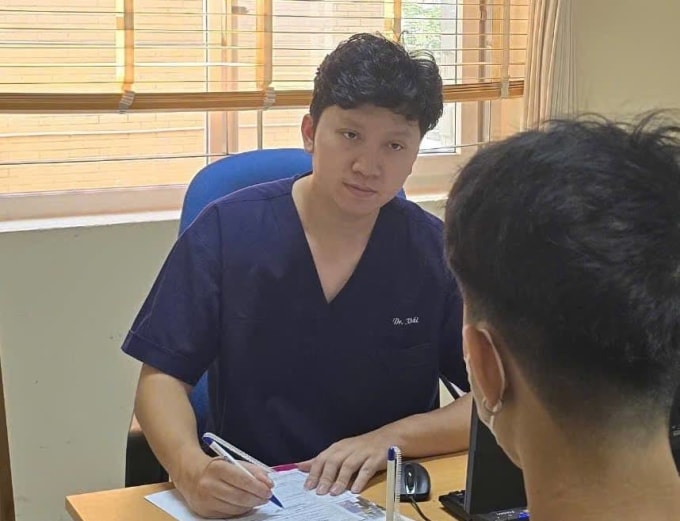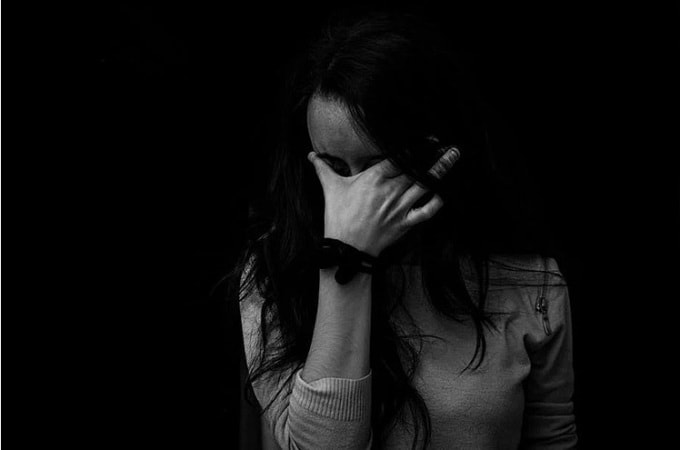Many people panicked after watching videos on TikTok, where 'self-proclaimed doctors' gave diagnoses and treatments that had no scientific basis.

A 29-year-old man went to E Hospital (Hanoi) for a check-up, then asked the doctor to prescribe medication to treat a sexually transmitted disease. He thought he had the disease after watching a video on TikTok, where a person in a white blouse analyzed symptoms such as fatigue when waking up and sweating as signs of zinc deficiency, leading to decreased testosterone and libido.
Believing this information, the man bought two boxes of zinc supplements himself but saw no improvement. Previously, the patient had been treated for gonorrhea due to unsafe sex, which made him even more worried.
After many sleepless nights of fear, he decided to go to the hospital for a general check-up. Dr. Pham Quang Khai, Department of Nephrology, Urology and Andrology, ordered the necessary tests. The results showed that the patient did not have gonorrhea, his testosterone levels were normal, and there were no signs of decreased libido. However, the patient still insisted that he had the disease based on what he had seen on TikTok. He asked the doctor to re-examine him and prescribe zinc-containing medicine to "improve his health".
In another case, a 35-year-old man panicked after having sex with a stranger. He had signs of pain in his private parts, painful urination, and believed he had HIV/AIDS after watching videos on TikTok. Although he went to major hospitals such as Bach Mai and Dermatology to get tested, the results were all negative, but he still could not escape the obsession.
Not daring to confess to his wife, the man was overwhelmed with stress and blamed himself. Finally, the doctor suspected that he had signs of paranoia and transferred him to the Central Psychiatric Hospital I. Here, the patient was diagnosed with anxiety disorder and paranoia due to excessive worry about his health.
A 45-year-old woman was in a similar situation. After experiencing leg pain and swelling, she searched online, believing she had kidney failure. She bought cigarettes following instructions on TikTok, which promised to reduce pain and swelling. However, these drugs actually contained painkillers or corticosteroids, which only provided temporary relief.
After several weeks of use, not only did she not recover, but she also suffered from more pain and fatigue, along with a dull abdominal pain. When she went to the doctor, he discovered that the woman had varicose veins and elevated liver enzymes, at risk of liver and kidney failure due to the abuse of drugs of unknown origin.
According to Dr. Doan Du Manh, a member of the Vietnam Vascular Association, using drugs of unknown origin and delaying medical examinations made her condition worse. This is just one of many cases affected by false information on social networks.
TikTok, characterized by short videos, fast and easy information transmission, is becoming the most popular platform today. However, besides positive content, this platform is also flooded with unverified information.
Many individuals and businesses take advantage of this to advertise medical examination and treatment services, sell illegal drugs and medical equipment. Many people wear white coats, call themselves doctors, and offer unscientific treatment methods such as fasting to treat cancer, pricking the fingertips to treat strokes, or claiming that mouth ulcers are caused by obesity. This information not only causes confusion but also makes viewers fall into a state of obsession, believing that they are sick.
According to the UK National Health Service (NHS), hypochondria is a psychological condition in which a person believes that they have a medical condition without a clear medical cause. This phenomenon often occurs when the individual receives negative information or is influenced by the surrounding environment.
People who are sensitive and easily influenced by images or information related to health often fall into this state. For example, when reading about a disease online, they may immediately feel that they have similar symptoms. In the context of the epidemic, many people have felt short of breath or fever even though they do not have the virus. If left unchecked, phobias can lead to anxiety disorders or serious psychological problems.
The main reason for this situation is the lack of knowledge and gullibility of the people. Many people are afraid to go to the doctor, feel sorry for the money or are subjective about their health. Meanwhile, those who advertise online have the skills of persuasion, easily gaining the trust of viewers.
"Information on social networks is diverse but mixed, making it difficult to distinguish right from wrong. Official content is often complicated and difficult to understand, while sensational, clickbait information is more attractive," said Dr. Manh.

Currently, Vietnam has no official statistics on the number of people suffering from obsessive-compulsive disorder, but according to Dr. Nguyen Viet Chung, Head of the Department of Mental Health, E Hospital, most cases have excessive fear of health. Many people rely only on normal body sensations or small signs to self-diagnose themselves with serious illnesses. Some people go to the doctor continuously to find peace of mind, while others delay because they are afraid of discovering the disease. Both groups are more likely to fall into a state of severe anxiety and paranoia.
This prolonged condition not only affects mental health but also causes the patient to collapse, lose concentration at work, delay treatment, and miss the "golden period" for treatment. By the time they arrive at the hospital, the disease has progressed severely and is difficult to intervene. Many people also lose money and get sick because they believe in unscientific methods.
Doctors recommend that social networks are a place where people freely share knowledge, but not all information is reliable. When experiencing unusual symptoms, people should go to hospitals or reputable medical facilities for accurate diagnosis and treatment. Absolutely do not listen to advice from "self-proclaimed doctors" or unverified information. At the same time, it is necessary to limit exposure to negative content, know how to filter information and practice critical thinking to avoid being lured. If anxiety persists and affects life, patients should seek timely support from psychological experts.
TB (according to VnExpress)